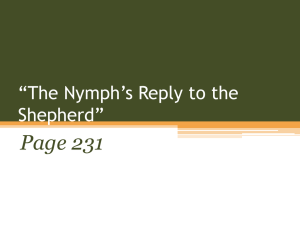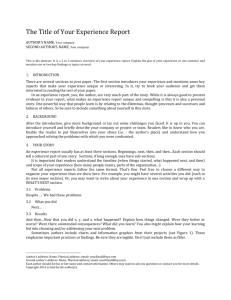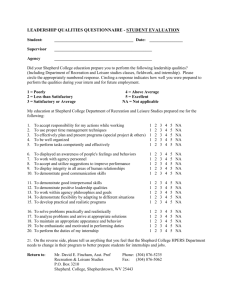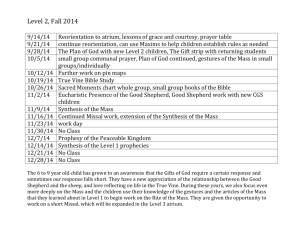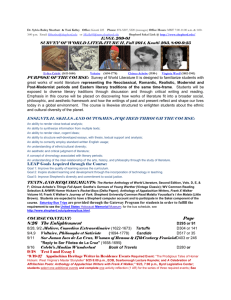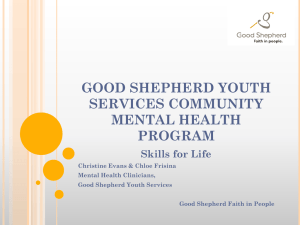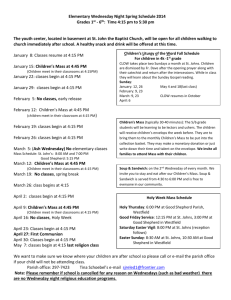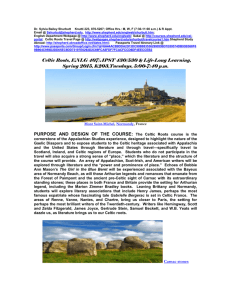100 - Shepherd University
advertisement
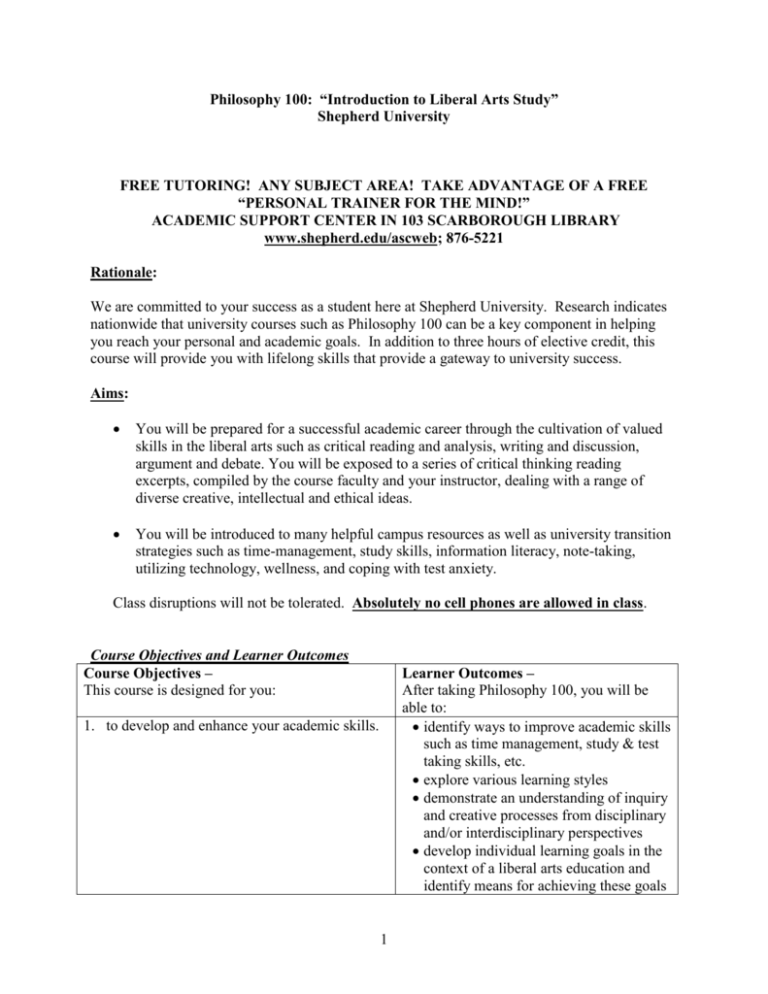
Philosophy 100: “Introduction to Liberal Arts Study” Shepherd University FREE TUTORING! ANY SUBJECT AREA! TAKE ADVANTAGE OF A FREE “PERSONAL TRAINER FOR THE MIND!” ACADEMIC SUPPORT CENTER IN 103 SCARBOROUGH LIBRARY www.shepherd.edu/ascweb; 876-5221 Rationale: We are committed to your success as a student here at Shepherd University. Research indicates nationwide that university courses such as Philosophy 100 can be a key component in helping you reach your personal and academic goals. In addition to three hours of elective credit, this course will provide you with lifelong skills that provide a gateway to university success. Aims: You will be prepared for a successful academic career through the cultivation of valued skills in the liberal arts such as critical reading and analysis, writing and discussion, argument and debate. You will be exposed to a series of critical thinking reading excerpts, compiled by the course faculty and your instructor, dealing with a range of diverse creative, intellectual and ethical ideas. You will be introduced to many helpful campus resources as well as university transition strategies such as time-management, study skills, information literacy, note-taking, utilizing technology, wellness, and coping with test anxiety. Class disruptions will not be tolerated. Absolutely no cell phones are allowed in class. Course Objectives and Learner Outcomes Course Objectives – This course is designed for you: Learner Outcomes – After taking Philosophy 100, you will be able to: identify ways to improve academic skills such as time management, study & test taking skills, etc. explore various learning styles demonstrate an understanding of inquiry and creative processes from disciplinary and/or interdisciplinary perspectives develop individual learning goals in the context of a liberal arts education and identify means for achieving these goals 1. to develop and enhance your academic skills. 1 2. to gain experiences in which you can relate to and value people of diverse cultural backgrounds. 3. to understand how to balance the freedoms and responsibilities that are a part of University life. 4. to understand your financial responsibilities in college 5. to understand the academic advising process 6. to consider the options available when making decisions. 7. to explore campus and community issues, resources, culture and history. 8. to gain knowledge and understanding of and experience in service learning programs. 9. to help promote self-care (wellness) decisions that will improve the quality of life 10. to be able to identify, locate, and evaluate information 2 enhance competency in academic skills including: framing questions/posing problems, evaluating information sources, writing, oral communication, and collaboration recognize the benefits of diversity know the freedoms and responsibilities that are a part of life at a liberal arts university recognize the responsibilities of credit select a major or identify several areas of interest know how to register for classes and whom to go to for advisement synthesize information when decision making and problem solving understand the decision making process identify important offices and resources on campus and in the community identify important issues affecting students on campus and in the community recognize the difference between service learning and community service apply in volunteer environments the concepts of leadership and civic responsibility as discussed in course identify and practice health-enhancing behaviors and reduce health risks to live safer, healthier lives; access, analyze, and evaluate health information, products and services in order to become health-literate consumers demonstrate awareness of environmental and safety hazards. effectively and responsibly use and share information for the problem at hand Required Materials Critical Thinking Readings. Available on Sakai [courses.shepherd.edu] Calendar. We require each student to have some type of a calendar or planner so you can more effectively manage your time and schedule. This may be electronic in form (cell phone, PDA, etc.). Calendars are also available in the Shepherd University Bookstore and on your Sakai website. Shepherd Email Account: All students are required to use their Shepherd email accounts. Copy of 2011-2012 Common Reading Course Requirements Class Attendance/Participation: Expected and Required. Service Learning and Common Reading Events: You are required to attend one Service Learning Event and one Common Reading Event during the fall 2011 semester. Reflective Writing Service Learning Event (due two weeks after service learning event attended) Assignments: Complete all homework as assigned. All assignments are explained in detail on the Sakai website. Grading Your final grade will be determined by the following scale: Assignment 1. Class Attendance/Participation 2. Assignments 3. Wellness Activity 4. Service Learning Experience Total Points 100 400 100 100 5. Information Literacy Activity 100 6. Exams 100 Late assignments will not be accepted. Missed class work cannot be made up. 3 Disability Services If you are a person with a disability and anticipate needing any type of accommodation in order to participate in this class, please advise the instructor and make appropriate arrangements with Disability Services (876-5453). Requests for academic accommodations are to be made during the first three weeks of the semester, except for unusual circumstances, so arrangements can be made. Students are encouraged to register with Disability Support Services to verify their eligibility for appropriate accommodations. More information can be found at: http://www.shepherd.edu/mcssweb/disabilities/index.htm. The Academic Support Center Get a personal trainer for your mind – for free! Located in Scarborough Library 103, the center offers free tutoring and more! Call for more information: 304-876-5221; e-mail: Missy Welsh at mwelsh@shepherd.edu; http://www.shepherd.edu/ascweb/ Tentative Topic Calendar – Instructor reserves the right to change the schedule if needed Critical Thinking Reading excerpts for in-class academic exercises will vary by instructor. Examples provided below: Week 1 Introductions, Syllabus, Sakai Setup, Calendar Scheduling Weingartner, Practicality of Liberal Education: Writing exercise Week 2 Enhancing your Personal Health Plato, Euthyphro: Discussion exercise Week 3 Active Study Strategies: Learning How to Learn Hume, A Treatise of Human Nature: Writing exercise Week 4 Stress Management and Test Taking Strategies Baier, The Need for More than Justice: Debate exercise Week 5 Positive Attitudes and Learning Goals Rorty, Philosophy and Social Hope: Discussion exercise Week 6 Managing your Resources: Time and Money Godin, “Contempt of Customer: It’s a Real Crime”: Debate exercise Week 7 Information Literacy Activity Schrag, Is the Common Good still Possible?: Debate exercise Week 8 4 Creative Thinking and Decision-Making Skills Hackworth, The Case of the Million-Dollar Decision: writing exercise Week 9 Multiculturalism and Diversity Musalo, When Rights and Cultures Collide: debate exercise Week 10 Academic Advising and Schedule Preparation Week 11 Job Seeking and Career Development Week 12 Experiential Learning Activity Week 13 Experiential Learning Activity cont. Week 14 Wellness Activity Week 15 Final Exam Week Final Exam is on ___________________ 5

